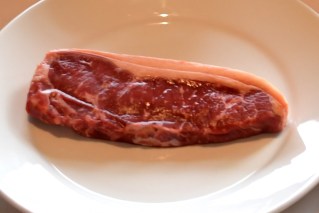Coronavirus means it could be lab-grown meat’s time to shine

Continued coronavirus outbreaks linked to abattoirs is throwing into question the ongoing role of mass slaughterhouses as part of our food supply chain.
Although the popularity of plant-based meat alternatives continues to rise, there’s an even more futuristic option looming on the horizon.
The business of lab-grown meat (or cultured meat) is just beginning to boom around the world, and in Australia.
KFC in Russia earlier this month announced it was going to trial a combination of 3D printing technology to try to build its famous nuggets, as part of its “restaurant of the future” research.
Lab-grown meat isn’t yet available on the market, but it’s a multi-billion industry to see who can get it on shelves first.
In Australia, one of the forerunners is Vow, which started last year, headed by Tim Noakesmith and George Peppou.
It was the first company in the world to make a food prototype from an undomesticated animal – using the cells of our very own Skippy to ‘grow’ a kangaroo dumpling.
“It’s safe to say there is excitement about Australia being a great contributor to these innovations,” Mr Peppou told The New Daily.

George Peppou and Tim Noakesmith from Vow, an Australian company producing lab-grown meats. Photo: Vow
While the industry is still small in Australia, the pair believes it will only take a few years for cultured meat to become an everyday purchase option for consumers.
“Before you know it you will be ordering your first taste of where food is going. We are crossing the next frontier – from idea to reality,” Mr Peppou said.

Vow’s kangaroo dumpling, the first cultured meat from an undomesticated animal. Photo: Vow
Animal, vegetable, or other?
Leigh Ackland is a biosciences professor at Deakin University, whose research field includes growing cultured human cells.
She said consumer sentiment is shifting away from abattoir-processed meat due to animal rights, environmental and moral issues, and now the coronavirus health concerns.
“There are lots of patents coming out now for making artificial meat,” Professor Ackland told The New Daily.
“It’s made under a patent generally, by companies that can afford to do that and it takes some years to develop.”
UK company Higher Steaks has created the world's first cell-cultivated bacon and pork belly, though the CEO notes consumer availability remains a few years away.https://t.co/OQlUIWmF1F
— Food Frontier (@foodfrontierorg) July 22, 2020
The name ‘lab-grown meat’ may conjure the imagery of a few cells under a microscope binding together, growing and sprouting legs and running away to the nearest barbecue, but it’s much much more tempered process.
What we will most regularly see (and soon perhaps eat), is a mixed of cell-grown animal protein and plant protein, Professor Ackland explained.
“You could only have a tiny, tiny proportion of the product with cells in it, grown in laboratory conditions, and the rest could be plant material,” she said.
This is similar to what KFC is proposing with its nuggets experiment.
As for if this meat-of-the-future is animal, vegetable or something different entirely is still up for debate.
As Professor Ackland said, it is animal derived, because its base cells come from an animal.
“But you know you could argue that what we’re eating nowadays is chickens that have been bred or selectively bred for their size or, or cows that have got lots of mutations that they wouldn’t have normally to make them bigger and more productive,” Professor Ackland said.
“And that’s not normal. So we’re sort of on the way anyway to changing the way we access meat.”








